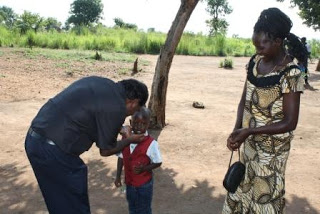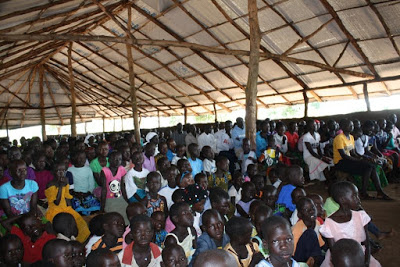UGANDA: South Sudanese Refugees at Northern Uganda Settlements in dire need of Pastoral Care

As our car approached Don Bosco Chapel in Zone one of Bidibidi Refugee Settlement, there is a feeling of excitement among Christian who have been waiting for the two priests to celebrate Mass with them at the chapel.
They had a prior communication about the priests coming and therefore this indeed is a special occasion because hardly do the refugees get to celebrate Mass because due to lack of priests. On Sundays, they usually make do with a prayer service led by a catechist who is also a refugee among them at the settlements.

As the car comes to a halt, our team comprising of two priests, one religious sister and three lay people is welcomed by a group of enthusiast congregants. Surprisingly, teenage girls form the majority of the congregation and one would easily mistake the service as a celebration meant for the youth. The chapel usually holds two services, the first one which begins at 8.00 o’clock is in English and Arabic while the second which usually begins at 10.00 o’clock is held in Bare language which is spoken by the majority of refugees at Bidibidi Zone I settlement.
22 year-old Margaret Atem albeit shy approached me wearing a broad smile on her face and asked if I could tell

the priest to bless her three-year old son. She has just attended the prayer service and therefore only needs the blessings from the priest upon her son.
Inside the chapel, long tree trunks form the pews; the left front row is reserved for the choir while the right front row is lined with UNHCR mats for the children. Within no time, the chapel is full to capacity and the joy among the congregants is palpable.
“When you go back, please remember that there is another community here in Bidibidi who are also in need of your services,” the catechist appealed to the priests at the end of Eucharistic Celebrations emphasising their need.
“In a month we may get to celebrate Mass only once, sometimes it can take two or three month before a priest comes. We are now used to attending services led by the catechists, this is part of our lives,” Rosemary Kute, a member of Don Bosco Chapel said.
The largest of the settlements hosting refugees from South Sudan is Bidibidi in Yumbe District, which according to UNHCR statistics is roughly 230 square kilometres (88.8 sq. miles) and houses at least 272,000 refugees, making it the largest settlement of its kind in the world. It is divided into five zones and each zone. Zone I for instance has 14 blocks of which each block has between 900-1000 families.
According to Bosco John Jurus, a 24-year-old resident of Bidibidi Zone II, the settlement has 29 chapels, and up until two weeks ago, there was only one priest from the Society of Divine Word (SVD) congregation and a group of four nuns from the congregation of Missionary Sisters of the Holy Spirit (SSPS) serving the whole settlement. Because of the vastness of the camp coupled with bad road, the priest could only visit one chapel on a Sunday. During special occasions, such as baptism, two chapels would come together to celebrate. The nuns each have special programs for the refugees and they visit the camp every day, though overwhelmed they are unrelenting.
Palorinya Settlement in Moyo district has three zones and 12 chapels. These are served by two diocesan priests, two Comboni Missionary priests, two Comboni Missionary Brothers and two Comboni Missionary Sisters. The four priests attend to two chapels each on Sundays while the rest of the chapels are attended to by catechists.
Palabek Settlement in Lamwo District has eight zones and 10 chapels. According to Rev. Fr. Lazar Arasu, SDB who is a parish Priest at Palabek, the settlement has about 42,000 refugees settled in the eight zones. Zones are further divided into Blocks and Each block may have over 100 households. Each household has five to seven persons, not necessarily belong to a family. The ten chapels are served by four priests from Don Bosco Missionaries (Salesians) and they usually manage to rotate and attend to all the chapels on any given Sunday.
Adjumani Settlement in Adjumani district has three zones and 24 chapels. According to Rev. Fr. Taban James Clement from the Diocese of Torit who is also a refugee at the settlement, Adjumani, has a population of 224,090 Refugees. The 24 chapels are served by four local diocesan priests from Zaipi Parish who serves only four chapels each Sunday.
“Apart from Adjumani, Bidibidi, Palabek and Palorinya Settlements, there are many other settlements in both Gulu and Arua dioceses that lack priests and therefore hardly have Eucharistic celebrations,” explained Fr. Arasu mentioning Imvepi and Rhino Camp I and II.
According to Rev. Fr. John Baptist Kaganda, Coordinator of Pastoral Department at the Uganda Episcopal Conference, the Bishop of Arua Rt. Rev. Sabino Odoki has made an appeal to his brother bishops, however the Bishops are still grappling with the issues of how to maintain those whom they might send to serve at the camps.
In the meantime, the likes of Rosemary Kute, Bosco Jurus, and Margaret Atem who are living in the settlements will continue making do with the prayer services led by the catechists on Sundays as they wait for the Lord to send more workers to His vineyard.
∽End∽
By Pamela Adinda, AMECEA Online News


